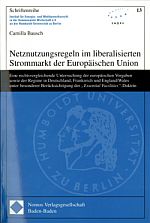
Netznutzungsregeln im liberalisierten Strommarkt der Europäischen Union
Eine rechtsvergleichende Untersuchung der europäischen Vorgaben
- Publication
- Citation
Bausch, Camilla 2004: Netznutzungsregeln im liberalisierten Strommarkt der Europäischen Union. [Schriftenreihe Institut für Energie- und Wettbewerbsrecht in der Kommunalen Wirtschaft e. V. an der Humboldt-Universität zu Berlin 13]. Baden-Baden: Nomos-Verlag.
For several years now, the European energy laws have been in a phase of transformation. Behind the much quoted catchwords liberalisation, privatisation, deregulation and re-regulation lie many more profound, often times even contradictory political, legislative and economic concepts. This is the context in which a functional Single European Market for electricity is to be established.
Due to the grid-bound quality of electricity non-discriminatory grid access is an essential prerequisite for the creation of effective competition in the electricity market. Since the market for the transport of electricity is commonly known to be a natural monopoly, the usual interest-counterbalancing competitive forces are ineffective, thereby giving new meaning and importance to the legislative acts regarding the organisation of the grid sector and the grid utilisation.
Dr. Camilla Bausch examines the European directives spurring the liberalisation process, as well as the rules of the German, French and English/Welsh governments. She places particular emphasis on the "essential facilities" doctrine – a concept based in competition law-, because grid accession rights and access grant duties frequently are derived from this doctrine.



